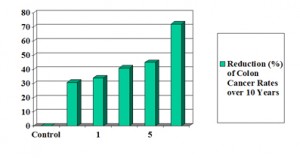There seems to be a trend that physicians see colorectal cancer in a younger population. In the past colorectal cancer was almost solely confined to people above 50. But now some people get diagnosed as early as 35 years or 40 years.
On March 10 CNN published a report from Sara Stewart, a film and culture writer.
Example of person who was diagnosed with colorectal cancer at age 45
She describes that she was diagnosed at age 45 with a stage 3 colon cancer. She thinks that the medical profession does not pay enough attention to toxins that may be causing colorectal cancer. Statistics show that colorectal cancer among younger patients than colorectal cancer among younger patients than 55 increased increased from 11% in 1995 to 20% in 2019.
At the same time colorectal cancer has decreased from 66 per 100,000 in 1985 to 35 per 100,000 in 2019. This means the incidence of colorectal cancer almost halved in 34 years.
Since the 1980’s doctors did colonoscopies on a large scale, which contributed to the rates of colorectal cancer decreasing. With a colonoscopy the doctor removes any identified polyps, which otherwise convert into colorectal cancer. It is a preventative procedure, which is very effective in preventing this cancer.
Colonoscopy screening
Earlier on the medical profession recommended screening with colonoscopy at age 50 and beyond; now the recommendation is from 45 onward. But more and more people are coming down with colon cancer at younger and younger ages, like 30 to 35. With a screening colonoscopy at the age of 30, the doctor can prevent these cancers because he/she removes colorectal polyps that are precursors of cancer. If the physician does not find a polyp at the age of 30, the next screening could take place at age 38 or 40. With a positive polyp test further screening could take place every 3 years. This would prevent a lot of colorectal cancers.
Statistics of colorectal cancer in a younger population
Newer cancer statistics show the following:
- In the US from 2011 to 2019, colorectal cancer rates increased 1.9% each year in people below the age of 55.
- In younger than 50-year-old patient death rates from colorectal cancer climbed 1% each year. At the same time the overall death rate of colorectal cancer fell 57% between 1970 and 2020 (largely due to the effect of doing colonoscopies).
- There are huge differences in cancer rates of colorectal cancer in different states: Utah colorectal cancer rates were lower: 27 cases per 100,000 people; in contrast, the number was 46.5 per 100,000 in Mississippi. This points to environmental/industrial factors playing a larger role in causation of colorectal cancer.
Causation of colorectal cancer in a younger population
In 2020 the National Cancer Institute reported about scientists “examining factors in the environment as potential causes of early-onset colorectal cancer. Such factors include air and water pollution, chemicals in soil and food, and pesticide use.” In some cases, there may be adverse lifestyle factors at play like poor diets (too much fat, too much meat and junk foods), excessive weight and lack of exercise. Dr. Kimmie Ng, director of the Young-Onset Colorectal Cancer Center at the Dana Farber Cancer Institute, told NBC News the following.
Environmental factors causing early colorectal cancer
“It isn’t just diet and lifestyle, there is something else. We see so many young patients with colorectal cancer who follow very healthy lifestyles and diets.” Dr. Folasade P. May, an associate professor of medicine in the University of California, Los Angeles Vatche and Tamar Manoukian Division of Digestive Diseases added: “When something is affecting people who have their birth years in common, then we know it’s something in the environment that has led this whole group of people to have higher rates. Among industrial poisons benzene, asbestos, vinyl chloride, radon, and arsenic are examples of toxic substances that can increase the risk of cancer to those who are exposed.”
Conclusion
On the one hand colorectal cancer has decreased in frequency by almost 50% between 1985 and 2019. But on the other hand, colorectal cancer in the younger population has a much earlier onset, way before the previously common age of 50. Doctors find the cancer at a later stage, which has a higher mortality rate. Experts expect environmental factors to play a role like exposure to benzene, asbestos, vinyl chloride, radon, and arsenic. In addition, air and water pollution, chemicals in soil, food, and pesticide use could play a role. In some cases, there may be adverse lifestyle factors at play like poor diets (too much fat, too much meat and junk foods), excessive weight and lack of exercise.
Start initial colonoscopy screening at age 30
The solution to this problem could be a very early colonoscopy screening around the age of 30. In the case of an examination that is negative for polyps at age 30, the next screening could take place at age 38 or 40. With a positive test for polyps at age 30 further screenings could take place every 3 years. This would prevent a lot of colorectal cancer in the younger age population.







